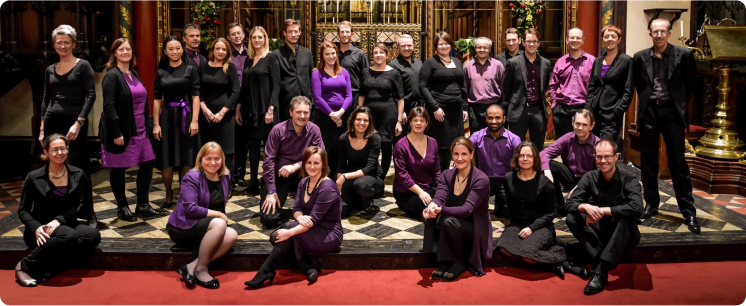Raising
the Bar
Essential Advice on Launching Your Amateur Choir

Our ultimate guide will cover every aspect of setting up and launching an amateur choir.
Taking the plunge and establishing your own venture can initially seem daunting but our guide and insights from leading choral expert Mark De-Lisser and amateur choir music director Yulia Hauer will ensure you’re as equipped as you can be to make this a success and to ensure you’re legally covered for the music you use.
-
Launching Your Choir
You need to define your musical style, sound and identity in order to attract an audience and vocal talent when launching your choir.
Setting up a choir committee can be a key part of this. This will enable you to assign different organisational roles to people with the appropriate skills who can steer the direction of your group.
With this committee set up, you can answer other important questions including where you will rehearse/perform, who will be your members/performers, what equipment you need, how will you promote your venture and more.
Still, it can be a challenge to establish a successful choir from scratch.
Some important things to consider:-
Repertoire
Choosing the right repertoire is vital. Make sure it is enjoyable for your choir to sing and perform.
-
Social
Add a social element and create a community around your choir.
-
Practice
Ensure that there are regular practices (and that they start and finish on time).
-
Fun!
Make it as fun as possible!



You need to have staying power when launching a choir. If you get 3 people at your first rehearsal, don’t be down about it. Instead, work with them and keep going. If people come in and see something great happening at the same time every week, then they will stay, be inspired and the choir will grow.
Mark De-Lisser -
Repertoire
-
Finding your Choir Leader and Choir Members



Make sure your repertoire is full of songs that people know and they can easily sing. This is a quick and instant win for you and your choir.
Mark De-LisserWho should be your choir leader? You can host an application process to find a suitable leader once you know what you’re looking for in terms of sound, then an interview and audition should follow.
Recruiting choir members and leaders can be a challenge for amateur choirs. Ideally, you want members to join and stay with your choir and this can sometimes be difficult when so many live busy lives.
Make sure your process for recruiting your choir leader and choir is as thorough as possible. It’s also important to remember that you ideally want your choir members to get on with each other. Forming relationships is a key reason why many join and you’re likely to hear better performances if the various members of your choir are friendly and enjoy spending time with each other through performing.
 Some effective strategies for finding choir members include:
Some effective strategies for finding choir members include:-
Perform regularly
Regularly getting out into public spaces and events and performing will raise the profile of your choir. These performances will not only provide opportunities to get valuable stage time, but enhance your profile in a local area and beyond.
-
Use of word of mouth
“Your community choir will spread the word for you. I ask my choir members to tell people about their experiences, not just keep the joy of singing to themselves. This is a really effective way of attracting new members.” Mark De-Lisser
Encourage choir members to spread word about the choir within the local community. Involving them in the recruitment of new singers and members will give them a sense of ownership and greater engagement with the choir’s long-term goals.
-
Involve the local press
Local newspapers, websites, blogs and magazines are always on the hunt for engaging stories in the community. Get in contact with them with a succinct and well-written email about the choir and what you’re looking for. If there are no newspapers, then try Facebook groups or community networks like Next Door.
-
Host open rehearsals
Running open rehearsals are not only fantastic ways of attracting new members but also gives a chance for existing singers to demonstrate their vocal skills. Provide tea, snacks and some time for everyone to mingle and you should be on the way to recruiting more voices for your group.
-
Perform regularly
-
Warming Up
Practice makes perfect when it comes to refining the performance of your repertoire.
However, before you begin asking your choir members to start singing as part of a rehearsal, they need to warm up. The best ways to approach this can depend on the abilities of your choir members and other factors such as how long they have been singing together and how comfortable they are with the songs.
A quick guide to warming up includes:-
Do it
Remember to do it! It can have a damaging impact on voices/vocals if you don’t.
-
Variation
Remember that every singer is different – so keep the exercises varied and tailor for individuals where appropriate.
-
Feelings
Pay attention to your feelings and how your body is.
-
Fun
Make it as fun as possible.
-
Posture
Remember posture and to loosen up the body and mind as well as the voice.
-
Talk
Talk to the choir about how they are feeling today.

-
Do it
-
Rehearsing
As non-professional singers, your choir might find it has to work hard to keep people engaged and motivated.
With amateur groups, you may also see different singers attend different rehearsals meaning there needs to be an element of flexibility in terms of song choice.

Start the rehearsal with songs that the choir knows and is familiar with. This can be a great way of gauging energy levels and what the group is capable of.
Yulia Hauer
 Here are some tips and insight into how to get the most from your rehearsals.
Here are some tips and insight into how to get the most from your rehearsals.-
Inclusive
Be inclusive – ask participants to give feedback on song choices/rehearsals.
-
Interesting
Make it interesting – vary repertoire, change order of songs.
-
Engagement
Find a day/time that works for your choir, hopefully when everyone is at their most engaged.
-
Location
Consider location and make sure this is convenient – and can cater to your needs/choir size.
-
Time
Make sure rehearsals are not too long – so don’t try to fit too much in. Focus on specific songs or parts that need working on.
-
Guidelines
Have some key guidelines – for example, talk less, sing more.
-
Inclusive
-
Choosing Songs and Music
The song choice of a choir is important as this is what defines its musical identity.
Consider simple songs where you can provide an interesting accompaniment and always aim to keep the music within the limits of the choir’s capabilities.
Choosing interesting repertoire will not only establish the identity of a choir but help attract an audience and build a following. Choir leaders should also ensure that singers can input into the process behind choosing repertoire and songs so they feel like their voices are being heard as part of the group. Creating and continually updating a Spotify list of potential songs to include in your choir’s repertoire can be an effective way of managing this.
Obtaining an Amateur Choir Licence is part of this too – this allows choir members to legally make photocopies of works and also permits minor arrangements (e.g. change of key) to suit the voices of the choir.
Get A License

Knowing that all my work is respected by choir leaders and protected by a licence is a real bonus, and will keep me arranging for as long as I have the strength to.
Mark De-Lisser -
Working out Arrangements



Keep your arrangements simple. A lot of the songs I arrange are pop tunes. So I make sure I keep it simple, it needs to be able to sing itself. This means choir members hear it, they like it and they sing it - and ultimately enjoy it.
Mark De-LisserThe arrangement of songs is a challenge for a choir leader as you need to make sure that the music works for the group and shows off their talents.
Getting this wrong can make it harder to perform, impact the quality of performance and negatively impact morale of the choir’s members. One way of ensuring a choir is on board with the arrangements is by letting them influence the decision-making process around the repertoire and the arrangements that work best for them and their voices.
Some ways to get your arrangements correct:- Practice different versions with your choir.
- Tailor for different sections of your choir.
- Play to your musical strengths.
- Keep it simple - there is musical power in less parts.
- Ask your choir what songs they want to perform.

-
Performance
Taking a step out of the practice room and onto the main stage can be a huge moment for a fledgling choir. Doing so can offer challenges for those unused to performing in front of an audience. Yet, when this does go well, the rewards far surpass any anxieties or doubts that choir members may have.
Some things to consider include:- Getting to the gig on time
- Any nerves/Stage fright and how to overcome it
- Enhance positive energy around the performance/event
- Warm ups
- Dress to impress
- Make sure you have given your choir clear instructions on timing, rehearsals, dress etc. If you are working with a sound engineer or lighting team, check that they have all the information they need


There’s something life-affirming about people doing something like singing for the joy of it. As adults, we are often discouraged from trying things for a fear of failing. Singing in a choir is a way for many of us to bypass this and be creative, bold and develop new skills.
Yulia Hauer -
Musical Facilities and Equipment


All you need is a space to run your choir and something to play songs with. You need to focus on making it more about singing than technology. No choir member wants to sit there watching you trying to make a Bluetooth speaker work for 30 minutes.
Mark De-LisserAlthough the main sound of a choir is made up of voices, you will likely need some forms of music technology and equipment to help you.
Although this doesn’t need to be too much, some resources could include:- Microphones
- Sound Technician/Engineer to handle tech issues
- Sound system/PA
- Music player to play a backing track


-
Give your Choir Goals
There is no doubt that choirs gel quicker and better if they have something to work towards.
Whether singing in an assembly, a full-blown concert or busking for charity, an upcoming performance can really provide energy and focus.
Make sure the goals of your choir are achievable/realistic. If they aren’t, then this can also negatively impact your group’s morale. An essential for all community choirs is to have fun. This is just as important as music itself.




Never get hung up on technique. If someone is totally relaxed, then that’s the perfect base to enhance their skills. You need to get choir members into an environment where they are totally relaxed, then they can have fun and enjoy it.
Mark De-Lisser -
How to license your Music Effectively and Legally


The licence keeps our costs down whilst giving us assurance that we are still paying money to support the composers of the music which we perform.
Cappella CaecilianaOrganising a choir will mean sharing music with the various members of the choir.
The best way to do this legally is through our Amateur Choir Licence. This allows choir members to make photocopies of works and also permits minor arrangements (e.g. change of key) to suit the voices of the choir.
The licence is a legal way of making access to music easier for choirs, enabling them to make copies without having to seek permission directly from the publishers.
Find Out MoreWhy is it Important to take out a Music Licence?

The PMLL Amateur Choir Licence is a must have for choirs rehearsing and performing concerts all year round.
Mark De-LisserOur licensing process is simple, easy and cost effective for amateur choirs looking to use music.
On first glance, we know that copyright can be a complex and confusing issue. But our licence simplifies this – for a small price, it will give you peace of mind that you’re not only within the law but also doing your bit to support the UK’s creative community. Without it, you could be at risk of being penalised or fined.



The PMLL licence has been BRILLIANT for our choir. We certainly wouldn't have been able to afford and perform several pieces without the PMLL. Would highly recommend
Mary, Liverpool Phoenix Voices There are numerous benefits to taking out our Amateur Choir Licence. They include:Get A Licence Now
There are numerous benefits to taking out our Amateur Choir Licence. They include:Get A Licence Now-
Saves on choir costs and resources
More cost effective to make copies than to buy or rent multiple songs for each choir member.
-
Saves time in clearing permissions for using music
No need to seek out permission from individual publishers to use each work.
-
Allows choirs to legally use music
Taking out a license means your choir is adhering to laws around copyright and intellectual property use.
-
Easy and intuitive dashboard
The process is incredibly simple thanks to our quick and easy online portal.
-
Helps pay composers and songwriters for the use of their work
Licensing the work of composers and songwriters ensures they are fairly compensated for their work.
-
Saves on choir costs and resources
-
Keep the Choir Running - Making Music
A huge amount of effort goes into setting up a choir, and then you need to keep the momentum going. Much of this is about making sure the music stays fun with new challenges and projects. But you need to underpin all that with good organisation.
All the jobs that you need to do to get set up will be quicky replaced with new ones to keep things running and growing. It can seem daunting but having your committee in place will help share the load.
Making Music
Making Music is the UK association for amateur music groups across the UK. They provide practical support and services to help with all the things that go into running a choir. Find out about what they do and request a joining pack on their website.



‘I cannot speak highly enough of Making Music as a supportive organisation, the individual advisors and people who are in it, who are obviously putting a lot of time, a lot of effort and a lot of thought and expertise into it’
Making Music Member-
Money
Bank accounts budgets and good record keeping are vital when people are paying you money in expectation of a service.
-
Promoting your Group
Raising and maintaining the profile of your groups is vital to continued success. A website and social media accounts are a great way to do this – but need some thought and planning.
-
Organisational Structure
Watching your informal choir grow quickly is thrilling, but as it does you need to keep up and make sure you have the right structures in place to manage things. Your organisational structure helps guide your financial responsibilities and decision making processes.
-
Policies and Contracts
They might seem boring and unnecessary at first but as your choir grows, they will help make sure you are doing things in the right way and prevent things from going wrong.
-
Safeguarding
If you work with children or adults a risk your need to spend some time thinking about how to keep them safe.
-
Money